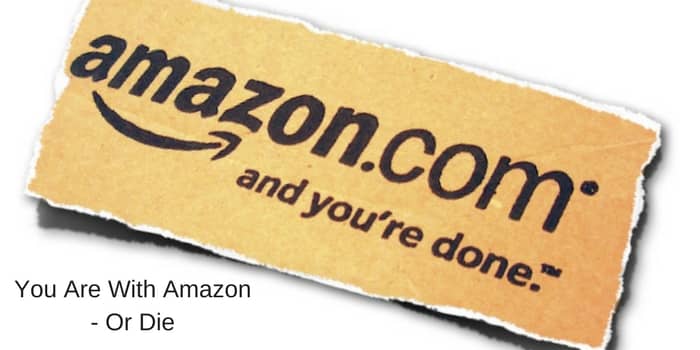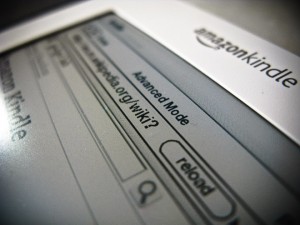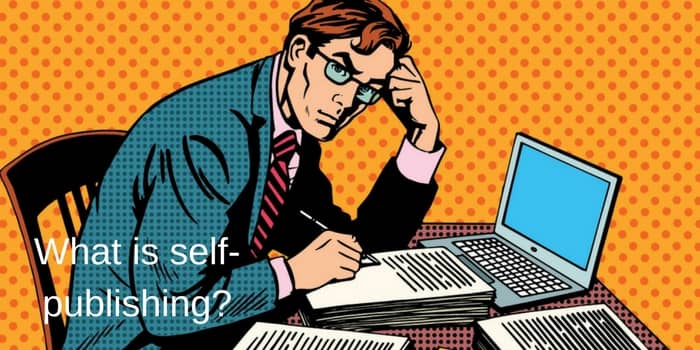 Is Amazon KDP Select the best publishing choice?
Is Amazon KDP Select the best publishing choice?
I have been doing a lot of hand-wringing recently about moving all of my ebooks into Amazon’s Kindle Direct Publishing Select program, and by doing so, granting Amazon exclusive rights to my ebooks. I wrote about this in my last post.
Yet my dilemma is small fry compared to the decisions that major publishers have to make each time their distribution contracts come up for renewal with Amazon. The latest battle of the giants was between HarperCollins and Amazon, which followed a similar episode of tooth gnashing, threats and miles of editorial argument when it was the turn of Hachette to negotiate the renewal of their contract with Amazon. In both cases, it all turned nasty for some months, until, all of a sudden the deals were done.
In truth, the Big Five publishing houses may be big, but at the end of the day, Amazon is far, far bigger when it comes to selling books and ebooks, and has by way of its near monopoly of online book selling, leverage that it can use every time a major contract comes up for renewal with the Big Five. For all the screaming, yelling and complaining, the Big Five know that without Amazon, their book sales, and therefore their bottom lines would take a huge tumble if they parted ways with Amazon.
In the current market, common sense says that you are either with Amazon, or die.
So back to my decision, which of course did not involve a bitter three months of negotiation for me with Amazon. Yet I did have to negotiate with myself. As a firm believer in independence, granting my ebook rights away, even if only for periods of 90 days, went against my grain. In a perfect world, other ebook retailers and aggregators would be able to compete and offer alternatives for Indie authors and publishers.
But it is not a perfect world, and the reality at present is that if you are an independent author and want to sell ebooks and make some money, there is only one logical means. Amazon and KDP Select.
I made my decision last weekend to start moving a few of my ebooks over to KDP Select, and can report that over only the last seven days, which included one free ebook promo, I sold more ebooks on Amazon than I sold over the last 12 months on Apple, B&N, Kobo and Smashwords combined.
I am now in the process of completing the move of all of my ebooks, as no matter what my idealistic notions about independence may be, I cannot argue with reality. I’m With Amazon – I’m Done.




the Amazon killer is under development, but it’s secret
It’s been a secret for a very long time now though, Tom. :)
i had a similar experience. I have daily sales on KDP now as opposed to only a few sales on all the other platforms.
Hopefully I can replicate your success, Steve. I’ll post an update in a month or so on my progress.
You do not really say why you chose Select over just listing with Amazon. You can be with Amazin without going exclusive
I have been with Amazon KDP since its inception. Mostly non-exclusively, but I have used KDPS on and off over the years. Usually with success, I might add. But my reluctance to commit fully was driven by idealism. I wanted to be independent. However, idealism doesn’t pay the telephone bill! :) So in the end, I made my decision because currently, Amazon are the only ebook retailer in the market who are innovating, or at least trying new ideas. The other deciding factor for me was that KDP Select offers promotional tools that authors can use and exploit, which no other retailer has even tried to implement. I was patient and waited for Apple, B&N, Kobo or others to do so, but as nothing has happened in years now, my patience ran out.
I’m KDP as well for my lone self-published travel story. The thing about it, IMHO, is that you need to be able to snag a piece of the Lending Library monthly pot. My book is priced at just $1.99 and wasn’t a Kindle Single which means just 35% royalty rate (imagine using the words “just 35% with big 5) but I actually get more money each time someone borrows my book than I do if 2-3 people had bought a copy.
That’s a nice perk of KDPS then, Doug. Borrows are also one of the reasons I decided to go exclusive with Amazon. But it’s early days for me yet. After so many years of being on other platforms, it’s going to take me a while to get a handle on how to use free books, countdown deals and how to leverage borrows. I’m not expecting miracles, but if the combination of monthly sales and borrows on KDPS is equal to, or hopefully a little above what I was getting before, I’ll be pleased with the move.
I’m hesitant to go Amazon-exclusive. Yes, they account for about 75 – 80% of my royalties, but I can’t deny that the 20-25% I get from Smashwords in the form of quarterly payments help. I have a lot of sales through Kobo I’d hate like hell to lose.
I have been as hesitant as you, Steve, for the last three years or more. But in the end, I made my decision based on the fact that KDPS allowed me to better promote my ebooks. Something Kobo, Apple et al, do not offer, even though I had hoped they would. So if I see a 20-25% increase in my Kindle sales in the next couple of months, I’m even. If it’s more, I’m ahead. But, if I see no increase, well …. stupid me!
Hitherto, I have maintained a similarly principled (arms length and disdainful) approach vis-a-vis Amazon’s KDP Select. My approach having been bolstered by advice proffered by other authors who had tried and got absolutely nowhere with it.
They were adamant it would be better instead, for an Indie author to spread his/her publishing effort around, such as to Smashwords and Kobo.
I have not yet published with any non-Amazon alternative, while sticking stubbornly to the default, box-standard KDP sales strategy. To try and make that work, I have gone on a Social Media promotional binge through blogging and Twitter.
Exposure has increased, as one might expect, but thus far next to zero effect on sales! Problem is my book is non-fiction, with a topic (Nuclear) that may intimidate many. Please link to my website if you would like to gauge what I mean.
I was wondering what your thoughts (on KDP Select) were regarding fiction versus non-fiction. My Kindle book is equivalent to almost 400 pages in paperback format, and I think it is ridiculous to be offering such a volume for a mere $1.99 via KDP Select. Or am I being short-sighted? I probably am, but would value your comments, and any from your followers.
And I also wish to comment on Book Reviews.
Have your titles attracted “enough” reviews yet? From what I gather, a minimum of three seems to be necessary. So, whether or not you use KDP Select, your chances are much reduced if you don’t already have those 2, 3, or 4 reviews under your belt … per title.
I am having a devil of a time trying to find people willing to review my book. Perhaps the stress of the past few months has caused many to batten down the hatches so they can do some repair work to their own lives. No spare energy left over.
You have an attractive blog, Andrew. And you also have an intelligent following.
What arrangements have you considered vis-a-vis getting a support group together to emphasize and materialize sincere (communal) book reviewing?
I see (at foot of this page) that your books have indeed been reviewed, but do you have enough?
I have come across enough scams or exaggerated promises already during my short but intense investigative journey. So, an alternative solution to this conundrum needs to be found. Others reading this page will have experienced the same obstacles as I.
Your thoughts?
Quite honestly, Glyn, I only know one thing, and that is that self publishing is a very tough business now. So much so, that in fact, I have done next to nothing about my books for the last couple of years. A few years ago, sales were plentiful, but as I didn’t have the time available to intensify my book marketing, I was happy enough to simply let them tick over. Sales still came/come in regularly, but only at about 20-30% of what they were in 2010-2012.
With the time I have available to me, I decided that KDP Select was the best option because it gives me the chance to boost my book promotion, as I can now set up free days, countdown deals and even now, PPC ads on Amazon well in advance, and it only takes me an hour or so to set them all up for a three month period. But this means sacrificing about 20% of my sales that came from other retailers.
As for your question about book reviews, my experience is that giving away free ebooks is the best way to gain reviews. But you have to expect the good with the bad, as there are always a few trolls around who like to give one star reviews. With regard to author support groups, or review exchanges, they have been tried for years, but have never worked to my knowledge,
My thoughts currently are a lot different to when I first started self publishing. Back then, it was easy (well almost) and fun. It was also very inexpensive, if not free. But now I think self publishing is maturing into a business, and those who are willing to invest will have the best chance of success. For example, a book stands no chance now unless it has a professionally designed cover, which obviously costs money. Investing in editing, paid promotion, paid advertising and even professional SEO services will become essential expenses for self publishers who want to succeed. In simple terms, self publishing is becoming a viable and perhaps lucrative business for some authors.
There is no reason it can’t stay a hobby or side income for many authors, but to succeed now, I do think one needs the mindset that self publishing is a business, and therefore needs investment, like any other business.
I read recently that only 1:500 sales generate a review, on average. I think it’s better than that, but then again we all often benefit from the friend/family early spike in reviews and sales. Perhaps over the long tail, the number is closer to 1:500.
A couple thoughts on what Derek mentioned about the business of self-publishing and the professional expectations: I think this is wonderful. My biggest reluctance to even enter the world of self-publishing was the nonexistent barrier to entry (I had been writing licensed merch books under contract for 13 years). On the one hand, It’s theoretically easier to stand out (professional covers, editing, etc) but on the other, there was just so much being self-published every day that it could be very hard to get readers to take a chance, particularly if they’ve come to expect free and lower quality. The maturation of the industry is a wonderful thing, IMHO, even if it now raises the bar and forces us all to improve our marketing and initial investments.
Do you think the free promos are a good idea for non fiction? I can see the appeal in fiction but surely if you do a non fiction promo then everyone who wants to know about the subject of your book will buy it and you won’t get further sales. Just interested in your view.
It’s an interesting question, Jenny. It would depend if you only have one book to promote. If this is the case, free promotions are of limited value, even for fiction. But they can help in improving book and author rankings, so it’s not a completely wasteful exercise.
If however, you have more than one title, free promotions can help in attracting sales to your other titles. I think this would work equally for non-fiction, so long as the topics of the books are connected in some way.
@Jenny. My apologies for not responding to your question sooner.
Free promos are less appealing for non-Fiction authors because we are not selling a brand; rather we are selling own “knowledge” or “expertise” in a given area.
To begin with, a non-fiction author has to start out being credible. You cannot write about rock climbing unless you have first been a serious and competent rock climber. I could not have authored my book had it not been for the fact I have already worked in the nuclear industry for 3 years. So that’s the first key point.
Free promos (of your main title) are not really a credible (certainly not an efficient) way to convince potential readers of your expertise or your credibility. You must first work out a way of reaching your target audience. In other words, don’t waste energy trying to sell wine making methods to people who drink very little of the stuff. That’s the second key point.
You must establish a Blog where you can expand your expertise beyond the remit of your book’s scope. In addition, you could readily author and publish a small book (booklet if you will) on a subject that is related to your main book’s topic, Then offer that booklet via a free promo. When doing so, make sure that inside this promotional book (which you could offer via KDP Select) you link back to your website, Blog, your Social Media accounts, and to all the Sales Pages where your main, non-fiction book can be seen, purchased, and then downloaded. That’s the third key point.
Hopefully, that’ll be enough to get you on the right track and ready for take-off into the stratosphere! Best of luck Jenny!
And also Jenny, if you follow me on Twitter (@Toxic_Trinity) you might be able to pick up more non-fiction promo ideas as time passes, as I already link to several worthwhile marketing sources and tend to re-Tweet or Favourite them. You can also subscribe to one of my lists. I think I have made one list that is marketing oriented. Just click on ‘Lists’ in my Twitter and take a look.
If not yet, then I shall make one such list soon, next time I log-in for a big Tweeting session.
Thanks for the comment, very interesting. I already have a website and blog (www.jabberwock.co.uk) and do get a lot of feedback usually. But – I’ll need to move it to WordPress soon. It doesn’t optimise for mobiles and laptops and from sometime this month Google started prioritising sites that do. My feedback (and sales) have fallen accordingly. An interesting point to consider but a bit of a bummer for those of us who set up our websites a few years ago.
This is a great discussion page on the topic, and I’m going to bookmark it even though I have checked notify follow up comments.
I have just published my non-fiction book on learning essay and report writing. I’m a tutor for 14 years for these subjects at university and in the workplace. My book is partly the result of my experiences with students and professionals, and the techniques, which I know work, and my PhD research of the last seven years on writing (what are the underlying mental mechanisms). I have no clue to be fair about self-publishing or any other kind. I wanted the book to be a promotion of my workshops and seeing groups in the workplace, lead by corporate managers looking to upscale their workforce to the demands of the 21st century digital age. My book is 66 pgs, but full of science and experience. You have to make an effort to read it but you will benefit from it if you do. My question is: I just put it on Amazon as an ebook £9.99, but Amazon put it in their prime member library free to readers. They said I get a share of global fund (don’t know what that is) if people read just 10%. So I see the point about promotion and selling more. Anyone got some info on the effects of being a prime member (kindle free library to subscribers) listed
book? especially the non-fiction type? I took it as a complement that Amazon put me on there, but there are 700,000 books on there I believe. Feeling like a speck of dust right now.I know I have the knowledge and I am a good communicator, but is this brand building really my flare?
The idea was the workshops would build the financial payoff not so much the book. Any thoughts? Aileen at Writing Academy
@Aileen … firstly, please scroll up and read Derek’s long response to my first comment. He dissects Amazon very well.
Seems like you’ve enrolled into an Amazon publishing function you did not first fully understand. What you and everyone must realize is … Amazon does not promote your book. Not mine, not his, not her’s. They are in the business of selling (or providing) e-books at the cheapest possible price … period. They probably make far more profit from selling their E-Readers (Paper-White, Voyager, Fire DX, etc.).
They will only promote book titles that have already broken through some kind of Sales Barrier. They will then cynically run with those, to maximize their profit. The author benefits are secondary.
Just identify all the options you initially enrolled in, fully understand their consequences, then decide if you would now prefer to opt out.
The “Longest River” will let YOU promote YOUR book using Amazon facilities (i.e., bells & whistles). But that’s the extent of it. So, if you do not take (and keep) full ownership of your book, then Amazon will “abuse” the situation, as they see fit. If it profits them, then they will do whatever you’ve consented to; unless you un-check the boxes you might not have checked if you had fully understood the consequences of each. In this regard you are not alone, so don’t be embarrassed.
I recommend you spend a couple of days doing several online searches, in order to fully understand all the publishing options Amazon provides. Their HELP system is good, and if you cannot find the answer you need from the pre-listed answers, then just send them an e-mail. You should get a response within 24 hours.
YouTube is another excellent source for tracking down answers to quirks in the Amazon KDP system. Just write a short question in the YouTube search bar, then see what comes up. Somebody has almost certainly already done what you have done. And there’s a better than 70% chance someone has then posted a video on the experience. If your first question does not locate an answer, then tweak a couple of the words and search again.
When messaging the Amazon Help Desk, I recommend you ask only simple questions about functional issues. Don’t bother asking philosophical style questions. The people employed by Amazon to respond do not share your (or my) culture. English is not their first language. They live well outside Europe and North America. They are polite and capable, but won’t be of value to you if you venture outside those questions related to function, performance, timing, quality, and Amazon specifics, etc.
Bottom line is Aileen … Amazon is neutral as regards helping people find your book title. That will be mostly down to you. Like it or not, brand building has now become an integral part of self-publishing. If you don’t learn how to promote both you and your book, then you won’t sell. I have had similar problems because I made certain false assumptions when I started out.
Stop thinking that Amazon is an online book shop — as I once did — and instead think of it as (nothing more than) a Search Engine for books.
Good point, Glyn. Google is a search engine for information, but Amazon is a search engine for things to buy. So it requires a very different mentality. And @Aileen, it has taken me years to learn how to use Amazon and KDP, and only reasonably well, but I’m still learning all the time. The best advice I can give is never stop experimenting with your book, price, cover, promotions or whatever. There is always something new you can do.